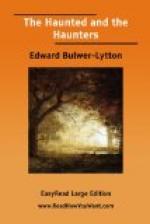Here he opened the fatal volume. I have heard of a thing they call Doomsday-book—I am clear it has been a rental of back-ganging tenants.
“Stephen,” said Sir John, still in the same soft, sleekit tone of voice—“Stephen Stevenson, or Steenson, ye are down here for a year’s rent behind the hand—due at last term.”
Stephen. “Please your honour, Sir John, I paid it to your father.”
Sir John. “Ye took a receipt then, doubtless, Stephen; and can produce it?”
Stephen. “Indeed I hadna time, an it like your honour; for nae sooner had I set doun the siller, and just as his honour Sir Robert, that’s gaen, drew it till him to count it, and write out the receipt, he was ta’en wi’ the pains that removed him.”
“That was unlucky,” said Sir John, after a pause. “But you maybe paid it in the presence of somebody. I want but a talis qualis evidence, Stephen. I would go ower strictly to work with no poor man.”
Stephen. “Troth, Sir John, there was naebody in the room but Dougal MacCallum the butler. But, as your honour kens, he has e’en followed his auld master.”
“Very unlucky again, Stephen,” said Sir John, without altering his voice a single note. “The man to whom ye paid the money is dead—and the man who witnessed the payment is dead too—and the siller, which should have been to the fore, is neither seen nor heard tell of in the repositories. How am I to believe a’ this?”
Stephen. “I dinna ken, your honour; but there is a bit memorandum note of the very coins; for, God help me! I had to borrow out of twenty purses; and I am sure that ilka man there set down will take his grit oath for what purpose I borrowed the money.”
Sir John. “I have little doubt ye borrowed the money, Steenie. It is the payment to my father that I want to have some proof of.”
Stephen. “The siller maun be about the house, Sir John. And since your honour never got it, and his honour that was canna have ta’en it wi’ him, maybe some of the family may have seen it.”
Sir John. “We will examine the servants, Stephen; that is but reasonable.”
But lackey and lass, and page and groom, all denied stoutly that they had ever seen such a bag of money as my gudesire described. What was waur, he had unluckily not mentioned to any living soul of them his purpose of paying his rent. Ae quean had noticed something under his arm, but she took it for the pipes.
Sir John Redgauntlet ordered the servants out of the room, and then said to my gudesire, “Now, Steenie, ye see you have fair play; and, as I have little doubt ye ken better where to find the siller than ony other body, I beg, in fair terms, and for your own sake, that you will end this fasherie; for, Stephen, ye maun pay or flit.”
“The Lord forgie your opinion,” said Stephen, driven almost to his wit’s end—“I am an honest man.”




